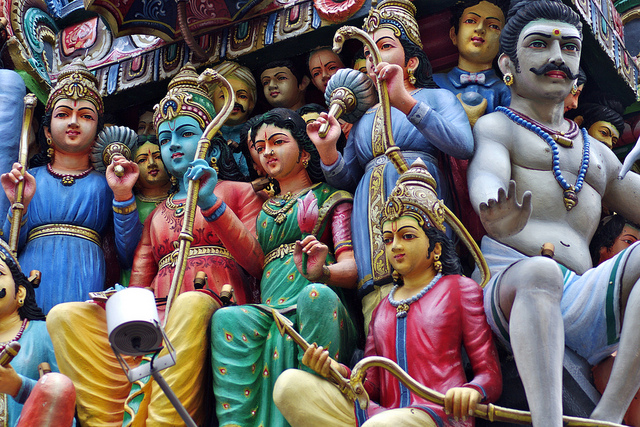Here’s a comparative summary of the contemporary religions, addressing their origins, core tenets, key observances, and common criticisms of each.
We will progressively add a more detailed account of each – first to get the detailed treatment is Hinduism.
1. Christianity
- Origins: Founded in the 1st century CE in the Roman province of Judea; based on the teachings, crucifixion, and resurrection of Jesus of Nazareth.
- Tenets: One God in Trinity (Father, Son, Holy Spirit); salvation through Jesus’ death and resurrection; love of God and neighbor; Bible as scripture.
- Observances: Prayer, sacraments (baptism, Eucharist), Sunday worship, Christmas, Easter.
- Criticisms: Historical role in crusades, inquisitions, and colonialism; denominational divisions; scriptural inconsistencies between Old and New Testaments. The only way to be a Christian with integrity is to pick a testament and reject the other one! If you love Jesus, you have to denounce creation. If you support the notion that God had favourites (the Israelites), you have to reject Jesus’ “Love one another”.
2. Islam
- Origins: Began in 7th century CE with Prophet Muhammad in Mecca; Qur’an revealed as word of God (Allah).
- Tenets: Strict monotheism; Five Pillars (faith, prayer, charity, fasting, pilgrimage); Muhammad as final prophet.
- Observances: Daily prayers (Salat), Ramadan fasting, pilgrimage to Mecca (Hajj), mosque attendance.
- Criticisms: Interpretational conflicts (Sunni–Shia split); issues with extremism and violence in political contexts; gender equality concerns in some interpretations.
3. Hinduism

- Origins: Rooted in the Indus Valley Civilisation (c. 2000–1500 BCE), based in a region which runs through northwest India into Pakistan; Vedas are earliest texts; not founded by one person.
- Tenets: Dharma (duty), karma (action), samsara (rebirth), moksha (liberation); Brahman (supreme reality); many deities.
- Observances: Puja (worship), yoga, meditation, pilgrimage (e.g., Ganges), festivals (Diwali, Holi).
- Criticisms: Caste system; contradictory creation stories; regional diversity leads to lack of doctrinal unity.
- For details, click here.
4. Buddhism
- Origins: Founded by Siddhartha Gautama (Buddha) in 5th century BCE, India.
- Tenets: Four Noble Truths, Eightfold Path; impermanence; compassion; ultimate goal is nirvana (liberation from suffering).
- Observances: Meditation, monastic life, mindfulness, Vesak festival (Buddha’s birth/enlightenment/death).
- Criticisms: Variability across schools (Theravāda, Mahāyāna, Vajrayāna); some argue it is a philosophy rather than a religion.
5. Judaism
- Origins: Dates to Abraham (c. 1800 BCE) and Moses (1200 BCE); covenant with God; Torah as scripture.
- Tenets: Monotheism; covenant relationship with God; following Torah and commandments.
- Observances: Sabbath, synagogue worship, kosher dietary laws, Passover, Yom Kippur.
- Criticisms: Internal divisions (Orthodox, Conservative, Reform); perceived exclusivity as “chosen people”; historical legalism.
6. Sikhism
- Origins: Founded by Guru Nanak in 15th century Punjab, India.
- Tenets: One God; equality of all people; devotion, service, justice; Guru Granth Sahib as scripture.
- Observances: Daily prayers, community service (langar meals), 5 Ks (articles of faith).
- Criticisms: Small global presence; persecution history; some political tensions (Khalistan movement).
7. Taoism (Daoism)
- Origins: Rooted in 6th century BCE China; attributed to Laozi (Dao De Jing).
- Tenets: Dao (the Way); wu wei (non-action); balance of yin-yang; harmony with nature.
- Observances: Meditation, tai chi, rituals, ancestor worship.
- Criticisms: Blending of philosophy and religion makes it difficult to define; superstition in folk practices.
8. Shinto
- Origins: Indigenous religion of Japan; ancient animistic practices formalised before 500 CE.
- Tenets: Reverence for kami (spirits); purity and harmony with nature; no central scripture.
- Observances: Shrine rituals, offerings, purification rites, festivals (matsuri).
- Criticisms: Lack of doctrinal clarity; association with Japanese nationalism in WWII.
9. Jainism
- Origins: Founded by Mahavira in 6th century BCE, India.
- Tenets: Ahimsa (non-violence), truth, asceticism, karma, liberation from rebirth.
- Observances: Vegetarianism, fasting, meditation, pilgrimages.
- Criticisms: Extreme ascetic practices difficult for lay followers; internal sectarianism (Digambara vs. Svetambara).
10. Baháʼí Faith
- Origins: Founded by Bahá’u’lláh in 19th century Persia (Iran).
- Tenets: Oneness of God, unity of religions, equality of men and women, world peace.
- Observances: Daily prayers, Nineteen-Day Fast, study of writings, service.
- Criticisms: Relatively new religion; persecution in some countries; critics argue it blends too many faiths without unique grounding.
📌 Overall Insight:
- Oldest faiths (Hinduism, Judaism) emphasise tradition and law.
- Universalist religions (Christianity, Islam, Buddhism) stress salvation/liberation paths for all humanity.
- Newer movements (Sikhism, Baháʼí) emphasise equality and reform.
